Longtime School of Engineering associate dean, professor announces retirement
June 14, 2024 - by Kim Delker
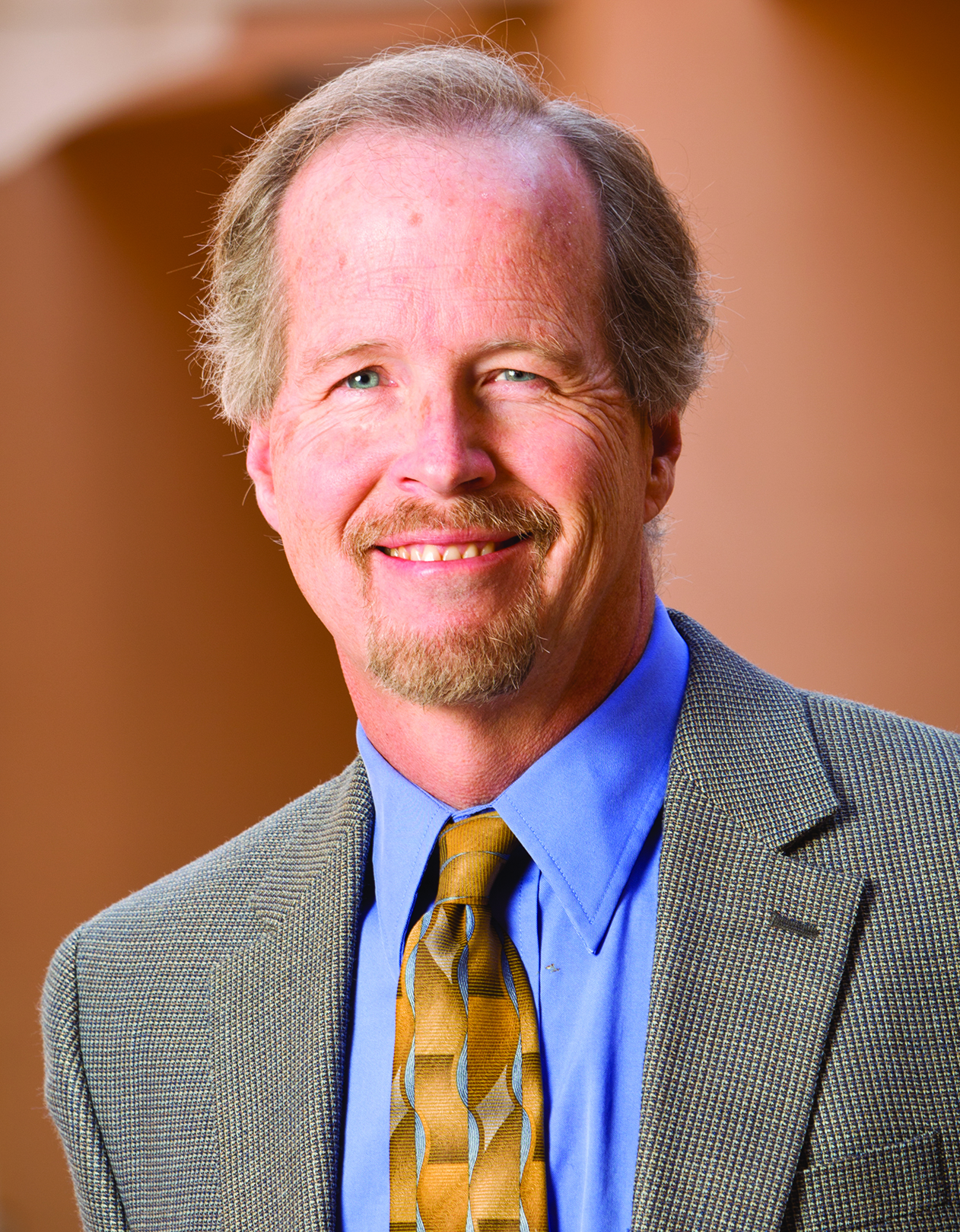
Charles B. Fleddermann, who joined The University of New Mexico School of Engineering in fall 1985, has announced his retirement from UNM, effective July 1, 2024.
Since 2002, he has been associate dean for academic affairs and community engagement in the School of Engineering, where he oversees the School’s academic advising and the Engineering Student Success Center. He also is involved in curriculum approval, statewide articulation and accreditation — including ABET, the agency that accredits programs in engineering and other related disciplines.
In 2023, he was interim Jim and Ellen King Dean of Engineering and Computing before Donna Riley began, and later that year, he was promoted to senior associate dean.
Fleddermann, a native of Boston who “moved all the time as a kid,” graduated from high school in Pensacola, Fla. The son of an aeronautical engineering professor, Fleddermann said he decided to pursue engineering as a career, thanks to the influence of a high school physics teacher.
“He created an electronics class, and I just loved it,” he said. “It got me excited about electrical engineering and the interesting things that engineers do.”
He earned a bachelor’s degree in electrical engineering from the University of Notre Dame in 1977, worked at Texas Instruments for a year, then entered graduate school to earn a master’s and Ph.D. in electrical engineering from the University of Illinois at Urbana-Champaign in 1980 and 1985, respectively.
For Fleddermann, going to graduate school was not a hard decision, even if at the time he wasn’t sure he wanted to follow in his father’s academic footsteps.
“I loved grad school,” he said. “It was a good gig.”
While in Illinois, he met his future wife, Liz, who was a graduate of the University of Illinois and was teaching in the Urbana, Ill., public schools. After earning his Ph.D. in the spring of 1985, he spent some time traveling around Europe before moving to Albuquerque to start his career at UNM.
Although he had a variety of choices of where to work, UNM was attractive for a few reasons.
He hadn’t really spent any time in New Mexico, but one evening while sitting in his apartment in Illinois he pulled out a road atlas and noted that New Mexico was covered in a lot of green, indicating mountains and national forests. “I saw all of that green and thought, ‘This is a place I could live!’ ”
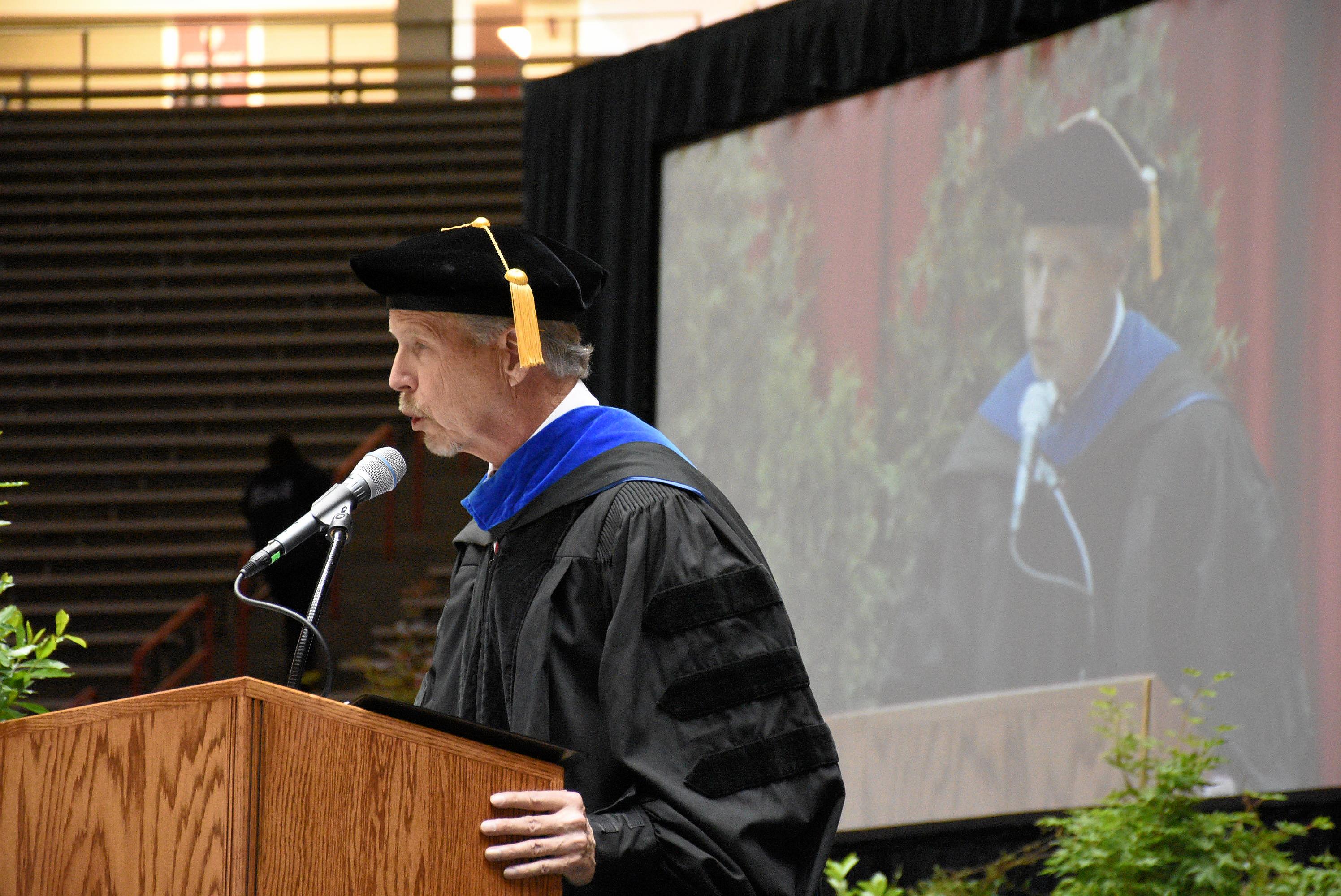
Charles Fledderman speaking at School of Engineering’s Convocation
He also liked the small-but-mighty spirit of UNM, a “we try harder” mentality that meant that that things were on the upswing at UNM, such as a growing number of ERCs (Engineering Research Centers). “There was, and still is, an upward trajectory in UNM Engineering that is very exciting.”
One part of that trajectory was a joint-appointment program that UNM and Sandia National Laboratories had created as a tool to attract young faculty to UNM. The program allowed Fleddermann to split his time 50/50 between UNM and Sandia for three years, and to set up laboratories and mentor students at both places. For Fleddermann, this was a very attractive option that he said was ultimately responsible for him choosing UNM over other options. Under the program, he was able to conduct research at Sandia, while at the same time moving up the tenure track in the Department of Electrical and Computer Engineering. He was able to leverage this experience into a research program at UNM in the areas of plasma processing of electronic materials, optical diagnostics of plasmas and solar photovoltaics.
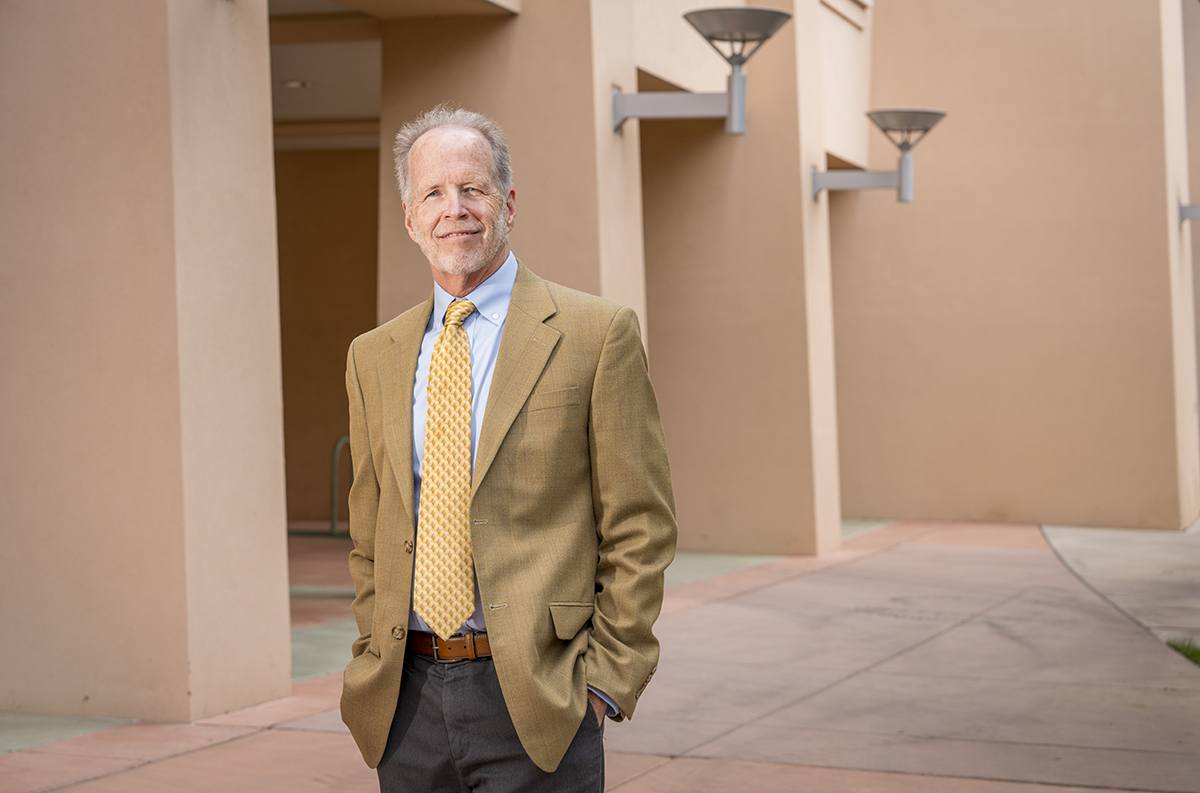
Chuck Fleddermann outside Centennial Engineering Center in June 2024.
Fleddermann became known in the academic world at UNM for teaching engineering ethics courses, as well as microelectronics and circuit theory. He was promoted to associate professor in 1991 and full professor in 1998.
After achieving tenure, Fleddermann began directing his career path more in the realm of student services, academic affairs, administration and outreach. He was selected as associate chair for undergraduate affairs in the Department of Electrical and Computer Engineering in 2001 and also served as acting dean of Graduate Studies at UNM from 2007-09. Along the way, he has served on a variety of university committees, such as research ethics, research centers, the conflict-of-interest committee, the campus housing committee, the core curriculum task force and various other groups.
He is the recipient of the Gardner-Zemke Professor of Electrical and Computer Engineering Award from 2002-05 and was the Electrical and Computer Engineering Distinguished Teacher Award recipient in 2001. He is also a senior member of IEEE, has been a member of the American Physical Society, the American Society for Engineering Education (ASEE), and was inducted into Tau Beta Pi and Eta Kappa Nu honor societies.
In 2020, he was a co-principal investigator on a National Science Foundation-funded project called “Study of New Strategies to Combat Harassment in Engineering” and also that year facilitated the agreement to sign UNM up as a member of the Engineering for Us All (E4USA) program, which is a National Science Foundation-funded pilot program to bring engineering courses to high schools. In New Mexico, the program partners with Sandia Prep High School in Albuquerque and Mescalero Apache High School in Mescalero, N.M., to bring design-based introductory engineering courses to students. He also was a co-PI of “Energizing Engineering Education (E3): An RET site at The University of New Mexico Investigating Energy Research and Engineering Practice.”
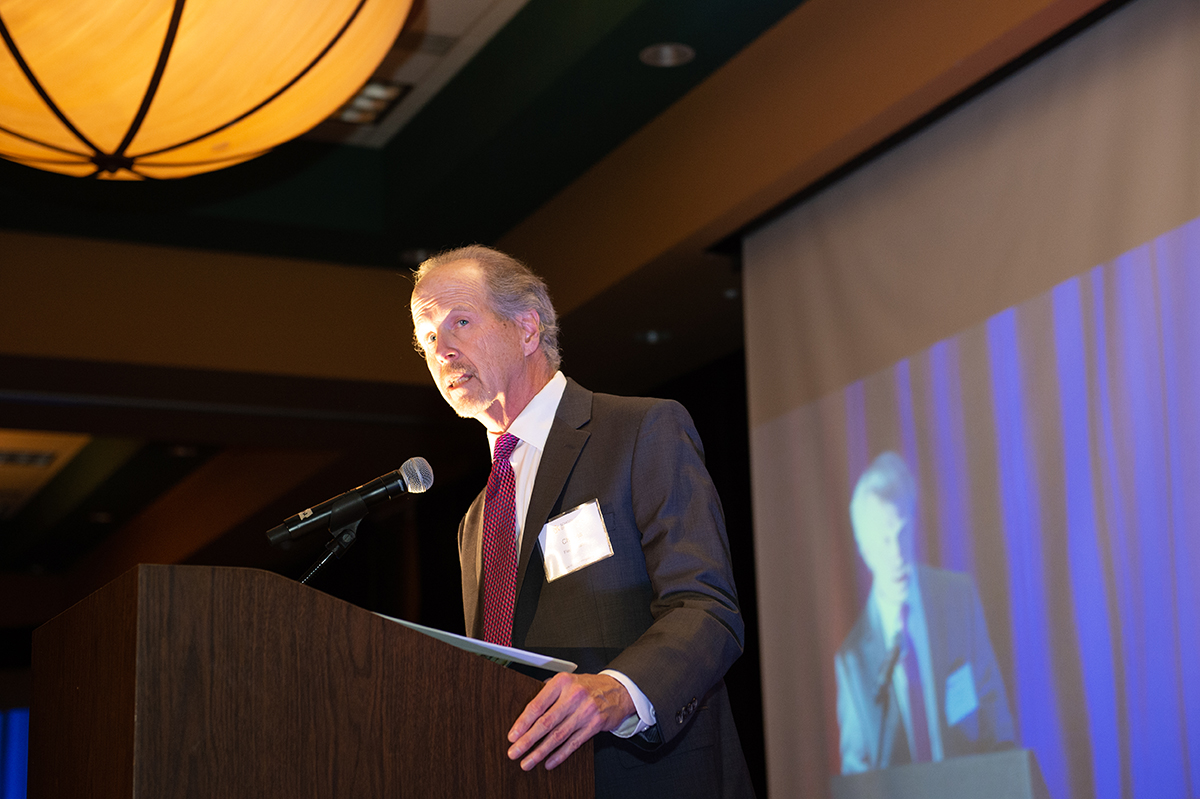
Charles Fledderman sepaking at the School of Engineering Distinguished Alumni Awards
In addition to serving as interim dean of the School of Engineering from January to March 31, 2023, he was the interim chair of the Department of Nuclear Engineering in 2019-20. And anyone who has attended any of the School of Engineering events in the last couple of decades will recognize Fleddermann’s voice. He serves as a frequent emcee for everything from Convocation to Distinguished Alumni Awards to Engineering Expo and many other student- and community-centered events.
Along with teaching, administration and service, another prominent part of Fleddermann’s resume involves his association with ABET, a nonprofit, non-governmental agency that accredits programs in applied and natural science, computing, engineering and engineering technology. ABET accredits more than 4,500 college and university programs.
For a couple of decades, he has been the resident expert on ABET in the School of Engineering, leading the School through several successful ABET evaluation cycles, and has traveled the globe on about a dozen trips as an ABET evaluator.
He said his involvement in assessment and eventually ABET grew slowly over the years, beginning with a national effort in the 1990s called EC2000 (Engineering Criteria 2000). As chair of the curriculum committee in electrical and computer engineering, a decision was made to move UNM toward the EC2000 standards, which required changes in curriculum and introducing outcomes-based assessment.
“It changed the way we had to do our work,” he said. “We knew we were turning out great engineers, but now we had to prove it.”
Leading this effort, which required a significant amount of work convincing often-reluctant faculty that the hard work of outcomes-based assessment and continuous improvement was worth it, meant that Fleddermann had to use more than just engineering skills — skills he would become known for during his career with both students and administrators.
“In order to get faculty on board, I had to become a true believer,” he said. “I helped them move from denial to acceptance.”
Fleddermann’s efforts in getting UNM to adopt EC2000 standards naturally led him to become involved in ABET, and he soon applied to be an evaluator.
During his career, he interacted with many students, faculty, alumni, UNM leaders and even leaders at other institutions and organizations, like the New Mexico Higher Education Department involving curriculum and program changes and expansions. Much change occurred at the university and the School on his watch, but he admits the most challenging time came just a few years ago.
“In spring of 2020, we had two weeks to pivot to offer all of our courses fully online because of COVID. That was tough,” he said.
Fleddermann said that what attracted him in the first place to the field of engineering is where he feels he has had the greatest impact.
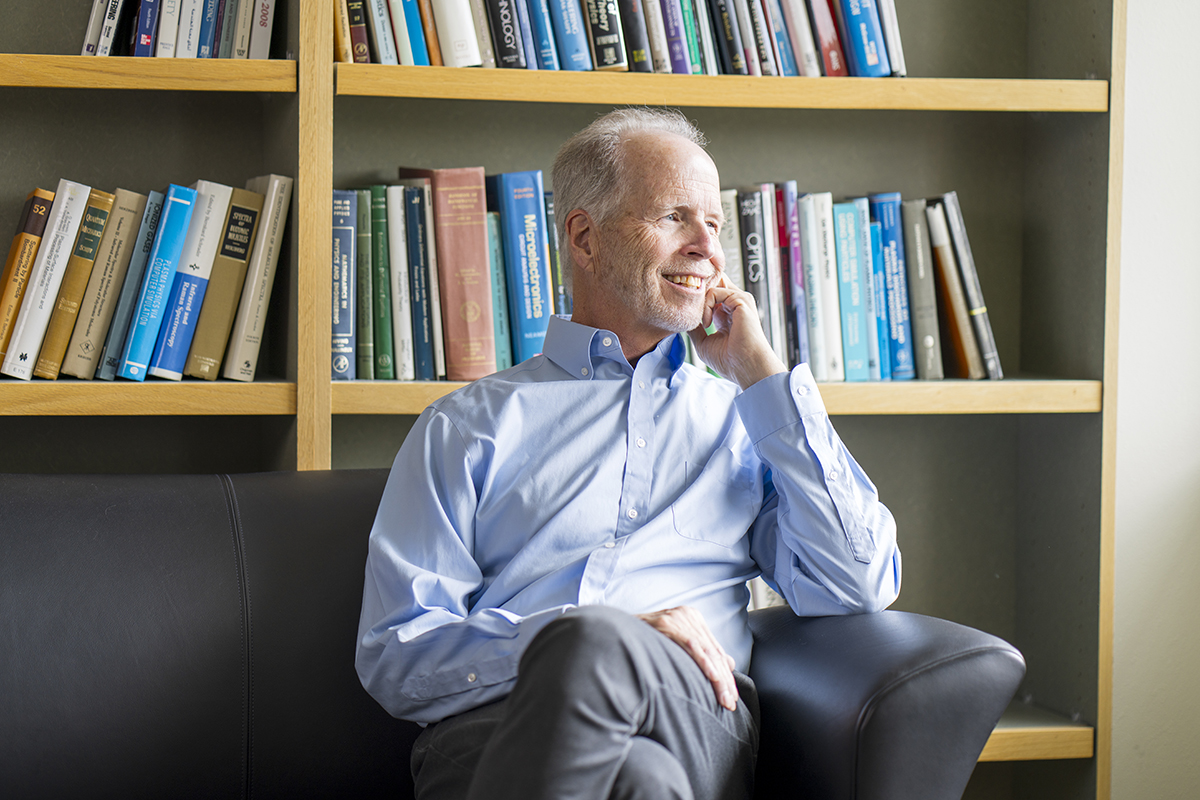
Chuck Fleddermann, in his office in June 2024, ponders his future and 38-year career at UNM.
“I hope that I have had an impact on the students, as well as improving the curriculum of our programs,” he said. “What we do with engineering and design curriculum, you get a warm, fuzzy feeling when you realize you created a program that helped students learn. We are helping students solve problems and helping faculty be better educators.”
Although he will be officially retired this summer, Fleddermann said he would like to stay involved as an ABET evaluator, as well as keep a hand in teaching and other related opportunities.
He and his wife have three grown children who are located around the country: Lauren, Rachel and Kathryn, and a granddaughter. He said he is looking forward to the flexibility of retirement — and having time for hobbies like running, biking, skiing, traveling and cooking — but admits that having spent four decades at UNM, there are things he will miss.
“It’s the people and the students. The students keep you young,” he said. “I’ll miss my colleagues as well.”
